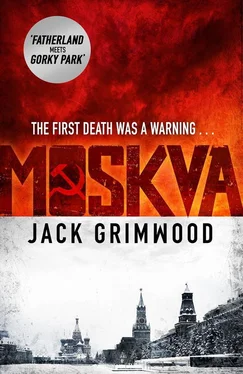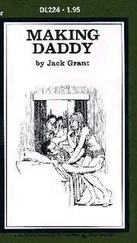The desk was still impressively huge and largely empty. The same obligatory portrait of the Queen as a young woman hung on the wall behind, and a smug little photograph of Sir Edward and Margaret Thatcher smiling for the cameras. Tom was so tired he could barely find the energy to hate it.
He was no closer to finding Alex, no closer to bringing her home.
What was it Sveta had said?
The commissar thought Alex would be kept alive until she was more use dead. In his heart, Tom had begun to wonder if they’d reached that point, if she’d joined the line of children laid out on marble slabs or lost to unmarked graves.
‘Are you listening?’
‘Yes,’ Tom said. Although he no longer knew to what.
‘You should know,’ Sir Edward said. ‘that I’ve had to make a formal apology for your behaviour to the Kremlin, and assure the Soviets you tried to leave Moscow without authority and in complete disregard for standing orders.’
‘You can imagine how much Sir Edward enjoyed that.’
The ambassador glanced at Mary sharply.
‘I hope,’ he said, ‘that your stupidity had nothing to do with trying to find my stepdaughter. When you had direct orders not to interfere further?’
‘Of course not, sir.’
‘I was asked,’ Mary said, ‘if I knew what might make you act like this. I told them I had no idea. Quite possibly, you were simply drunk. You’d have to be to take a Russian girl with you.’
‘You didn’t say he took a woman with him.’
‘Russian girls will do anything, sir, if they think there’s a chance of a foreigner marrying them.’ Mary stared at Tom, her eyes unforgiving. ‘Did you consider her safety? Did you think what trouble she’d be in?’
‘Dare I ask her age?’ Sir Edward enquired acidly.
‘It wasn’t like that.’
‘I imagine it was.’ The ambassador sat back in his chair. There was something dangerous in his gaze, something so contained that Tom remembered his thought about Sir Edward knowing exactly what he was facing. This was a man holding his fury in check with a degree of self-control that was almost brutal.
There were new lines around the ambassador’s eyes.
He’d shaved badly that morning, missing a patch of slightly greying bristles under his jaw. The fingernails of one hand looked almost dirty. Sir Edward’s clothes were as beautifully made as ever, but he wore them with less assurance.
Mary, on the other hand, looked immaculate. Her turnout, as always, was the smartest in the embassy. Her voice, when she spoke, was as clipped as Sir Edward’s and sounded borrowed from the 1940s. Tom wondered again how hard it must be to be black, a woman and senior in an embassy where everybody of any rank was automatically white and male.
Very, from the flat look of contempt he was earning.
He’d expected to be shouted at.
God knows, he deserved their rage.
Instead he’d been marched in by Mary Batten, who’d sat in a chair to one side and said little until Alex was mentioned. Lady Masterton was nowhere to be seen. This meeting was entirely official. Rather than shouting, Sir Edward was icily polite. That’s how furious he was. Tom could hardly blame him.
‘You shouldn’t believe him, sir.’ Mary said. The ambassador glanced at her. ‘That this wasn’t about Alex, sir.’
The ambassador sat back and rocked forward, patting his pocket as if searching for something – a sure sign of an ex-smoker. Tom knew the feeling. He wanted a cigarette too. And a drink. It was two days since he’d had either.
‘I just wanted her found,’ Tom said.
The ambassador was out of his chair before Mary could move.
Then she was moving too and came to stand very close beside Sir Edward, but not quite touching. She’d fallen into a fighting stance without even thinking about it and her gaze was on Tom. It said: Don’t move . And Tom did what he was told.
‘You know nothing about me,’ Sir Edward said. ‘Nothing about my marriage. Nothing about Anna’s life before we met. Nothing about how we started. You have no idea how much Alex means to me…’
‘ Sir, ’ Mary said.
Sir Edward sat with as much gravity as he could manage.
‘Get this idiot out of here,’ he said. ‘Arrange with London to send him back early. Meanwhile, he’s to keep to his flat and write that damn report. At the end of which, he goes home and good riddance. Take back his embassy pass. Have his post delivered to the foreigners’ block. Make sure I don’t see him here again.’
‘You won’t,’ Mary promised.
Sometimes you lose a piece of yourself. Sometimes someone steals it. She couldn’t take back what was taken. But she could still take what had taken it. Wax Angel’s logic wasn’t the world’s. The world’s logic was safe and cowering and servile. She couldn’t expect everybody to be as clear-eyed as she was.
The bus driver was reluctant to let her on board. Even more so when he realized she didn’t have the money for a ticket. So she told him she’d fought in the Great Patriotic War so that little brats like him would have a future and if she’d known she would be treated like this, she wouldn’t have bothered. He asked – very rudely, she thought – what she’d done in the war. Cooked, cleaned, encouraged the troops from the safety of a mattress?
She told him she’d been a sniper in Stalingrad.
She’d shot five German officers in four days, one of them a colonel.
While his own father or grandfather had probably been thieving from the shops or complaining that he couldn’t march because his feet hurt, she’d been eating rats in ruined factories, wrapped in sacks for camouflage and to keep warm, and she’d been happy to do it, grateful for the opportunity.
The little shit would still have made her get off, but by now everyone over sixty was nodding and looking serious; some were watery-eyed and the driver had more sense than to push it. He’d let her travel to the next town and when she shambled down the aisle to disembark at the concrete block that passed for its coach station, an old man in a nice coat who was going further stood up and stopped her.
‘Here,’ he said.
He tried to push fifty roubles into her hand.
When she shook her head, he insisted.
She’d looked at him.
‘I was there.’
He was too. She could see it in his eyes.
He didn’t seem surprised when she kissed his cheek. Simply put his hand up to touch the spot. It was fine, kissing his cheek like that. Quite possibly they’d known each other at some time.
The next bus driver had looked at her doubtfully but she’d told him she was on her way to see her grandchildren and waved the fifty-rouble note at him. He couldn’t change it but he let her get on the bus anyway. You were hardly going to refuse someone travelling with a fifty-rouble note, were you?
It took her longer than she had thought it would to travel the distance.
All of it she did by bus, except for the last stretch where she begged a ride with a lorry delivering fridges. They were large and smart and white. Odd, really. In her memory, fridges were tallow yellow.
The driver assured her that these ones even worked. Mostly.
The last few miles were the most complicated. She was tired and hungry and felt as if she’d been travelling for days. It didn’t help that she got lost, which forced her to retrace her steps back to a wretched small-town bus station. She got the right coach this time though, one that delivered her to the village where she got the lift with the lorry. The driver gave her coffee and shared his packed lunch, and though he opened the windows when she began to sweat a little under her rags, he did it casually, as if he simply needed air. She liked him.
Читать дальше









![Георгий Турьянский - MOSKVA–ФРАНКФУРТ–MOSKVA [Сборник рассказов 1996–2011]](/books/422895/georgij-turyanskij-moskva-frankfurt-moskva-sborni-thumb.webp)


